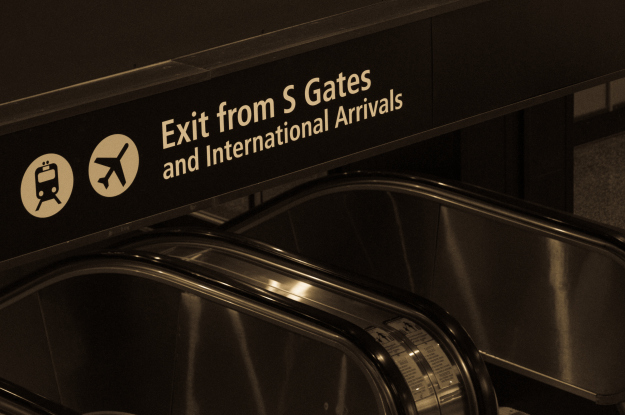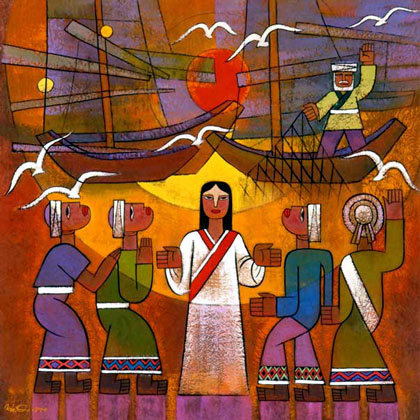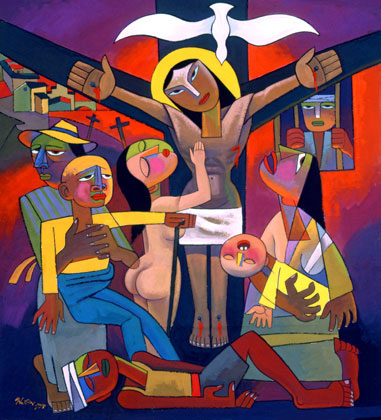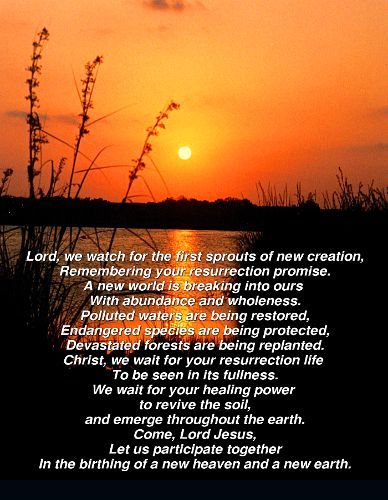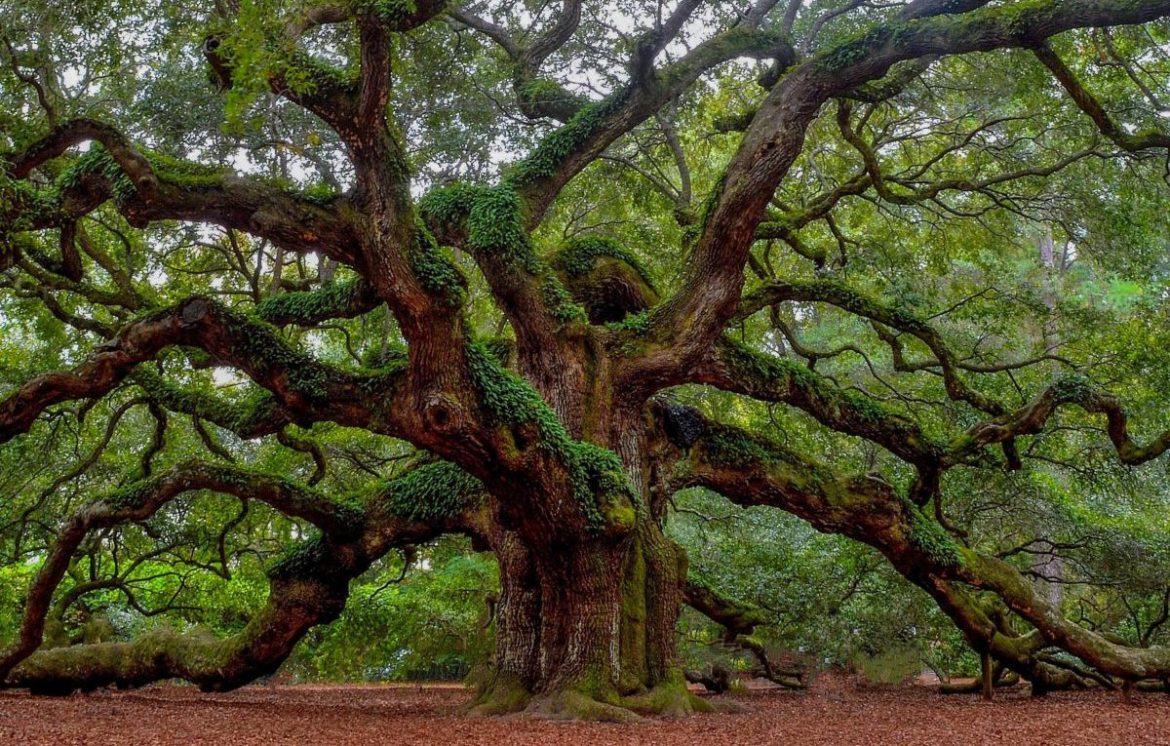Nine years. That’s 3,285 days. It’s hard for me to even begin to imagine what nine years of being separated from my family would look like. My parents live in Australia and they visit here once a year and every few years I go down there to visit them for Christmas. It’s a long flight, but you can watch four movies in a row and then you are there. The small amount of separation that I feel must be nothing compared to a family that hasn’t been allowed to see each other, hug each other, or be in the same country let alone under the same roof for nine years.
Two years ago I met a man named Yemane (pronounced yuh-mahn-nee) who fled Eritrea escaping persecution with his younger brother. They traveled through countries like Sudan and Libya where he met other hostilities. Eventually, after a seven year journey they were able to resettle here in Seattle. A few days after Yemane arrived to the US, we were chatting and he explained that he had a wife and three children who were still back home in Eritrea and things weren’t safe for them there and soon they were going to have to flee to a refugee camp in Ethiopia.
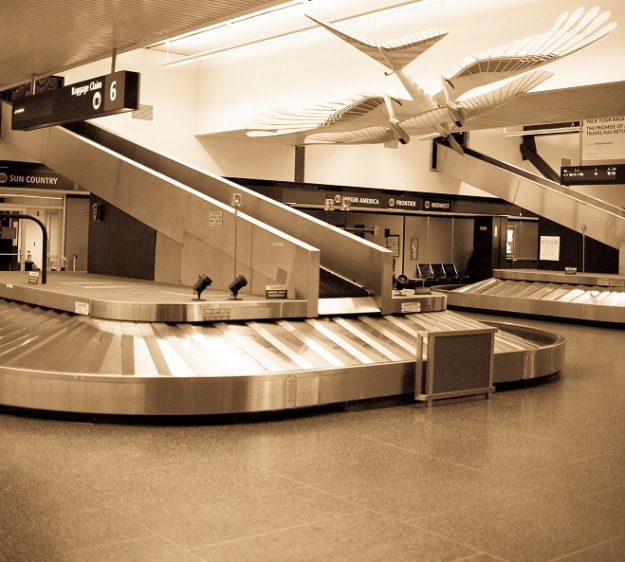
Three weeks ago I got a call from Yemane and he sounded excited. He was talking fast using his newly acquired English (he didn’t speak English when he arrived) and he told me that his family was coming. “They will be here next week,” he said. I was excited and I told him that I would be there with him at the airport when they arrived and we started making preparations. I’ve had the privilege of going to SeaTac airport dozens of times to pick up refugees and help them begin their new lives here. To me baggage claim is holy ground. The times when families are being reunited are always extra special. It’s hard to explain how powerful these moments can be to people who haven’t experienced them. The closest comparison is when military service men and woman reunite with their families after stepping off the plane.
A lot happens in nine years, a lot changes. A son who was only one years old is now ten. A daughter who was eight is now becoming a young woman. A husband who spoke no English now can. But some things don’t change either. A wife still remembers how to make her husband’s favorite meal. A father’s love for his children still remains. A family is still together, and now not just in spirit. They are home together.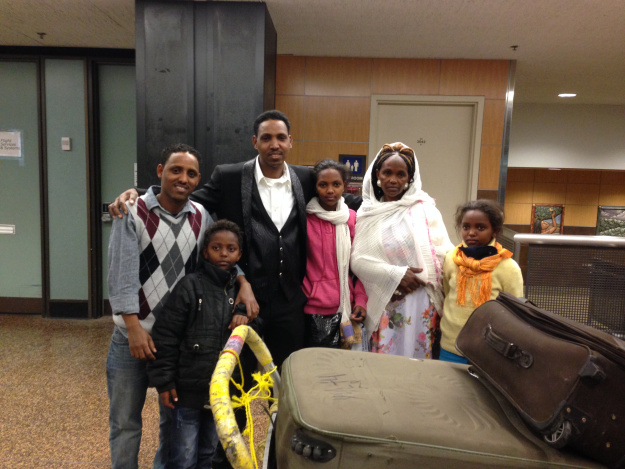
Originally posted by World Relief Seattle at http://worldreliefseattle.wordpress.com/2014/02/12/nine-years-divided/
Today’s Lenten prayer comes from Cesar Chavez (1927 – 1993) – Mexican American farm worker, labour leader and civil rights activist. He did much to raise awareness of the need for justice for those at the margins and it seemed very much in keeping with my post this morning about homelessness.
This was a great place to start my personal reflections this morning. Here are a couple of powerful quotes from Cesar Chavez writings that highlight this concern. I suggest that you read through these several times reflecting on your own commitment to justice and acceptance then read the prayer at the end aloud.
“We cannot seek achievement for ourselves and forget about progress and prosperity for our community… Our ambitions must be broad enough to include the aspirations and needs of others for their sake and for our own. “
“Social justice… you see… the oppressors always underestimate the oppressed and the oppressed almost always overestimate the oppressor.”
The following prayer comes from the Mosaic Bible whose meditations have really nourished my soul throughout Lent in past years.
Show me the suffering of the most miserable
So I will know my people’s plight
Free me to pray for others;
For you are present in every person
Help me to take responsibility for my own life;
So that I can be free at last.
Give me honesty and patience;
So that I can work with other workers.
Bring forth song and celebration;
So that the Spirit will be alive among us.
Let the Spirit flourish and grow;
So that we will never tire of the struggle.
Let us remember those who have died for justice;
For they have given us life.
Help us love even those who hate us;
So we can change the world.
Amen.
After reading Chavez’s prayer this morning I read Psalm 99 which talks about God in these words:
Mighty King, lover of justice,
You have established fairness.
You have acted with justice
and righteousness throughout Israel
Exalt the Lord our God!
Bow low before his feet, for he is holy! (Psalm 99:4,5)
The question I grapple with as I read this and reflect on how I make a difference in the lives of others is Where do I establish fairness and act with justice in my life today?
This week the Lenten reflections on Godspace will focus on homelessness. I had planned to write a traditional post to start the week by talking about the statistics and the challenges of homelessness in its many forms from refugees to street people. But that just was not resonating in my spirit. As I listened to the rhetoric flying backwards and forwards about World Vision, and read about the growing ground swell for immigrant reform it occurred to me that home is more than a place to live and the challenge of homelessness is more than that of providing a roof over someone’s head.
Home is a place where we feel loved, safe and accepted. The deep longing of all our hearts is to find our way home. Unfortunately there are many homeless exiles in our world because of our rejection. Some we reject because of their sexual orientation. Others we turn away from because of their disabilities, or their ethnicity or their social status. Sometimes we reject people because they don’t adhere to God’s law in the way that we interpret it.
I could not help but think about that in church on Sunday as we read the story in John 9:1-41 of the man born blind whom Jesus healed. This story is amazing, not because of the miracle Jesus performed but because of society’s response. The man is doubted by his friends who begin to wonder if he really was born blind, abandoned by his parents who are afraid of the religious leaders, and thrown out of the synagogue by the Pharisees who were totally closed to anything outside their understanding of the law.
Their response leaves him homeless, without friends and without a religious community to support and guide him. Then Jesus comes back into the picture, and reaches out to the once blind man bursting out beyond the rigid barriers of blame and condemnation with non judgmental acceptance. Jesus offers him a place of belonging, a place in the family of God to call home.
How often I wonder have I been blind to what God is doing in someone’s life because that person’s understanding of God and faith is outside the bounds of what I think is acceptable? How often have I denied them a home in the family of God and stripped them of humanity because of my judgement of their behaviour or their appearance? How easily do I forget that I too was once without a home in the family of God, blind to the truth of Jesus’ all embracing love?
Overcoming this type of homelessness requires a transformation of our attitudes from blame and condemnation to acceptance and love. Jesus finds many people acceptable that we do not. He goes out into the highways and byways and says come to the unacceptable – to male and female, to black and white, to Jew and Greek and I think to straight and gay, to rich and poor, to all that we want to exclude and deny a home to.
We need to remember that it is only by the grace of God that any of us find our way home. Our job is not to condemn but to accept without judging those who are searching for a home. We should focus not on what they have done wrong but how we can support and help those around us on their journey.
This resources is out of date. Please see our latest resource list.
Last year I separated out the stations of the Cross from other Good Friday resources as I know many churches like to have Stations of the Cross available for people to walk throughout Holy Week. There are thousands out there but I have tried to put together a collection from around the world attempting to highlight some of the challenging issues of our turbulent world that are portrayed and have continued adding to that theme this year. Most of the images are far from the traditional stations of the cross though I have ended the collection with a mimed rendition of Sandi Patty’s Via Dolorosa. If there are other international images you think should be a part of this collection please add them in the comments. I would like to continue to enrich this list each year and there is still enough time before Good Friday for me to update this post. Enjoy!
Lets start with an explanation of the stations of the Cross:
Another excellent article on the development of the Stations of the Cross
From Australia
From New Zealand
This series comes from Hamilton New Zealand
Cityside Baptist church in Auckland New Zealand has held an exhibit of contemporary icons to reflect on at Easter for a number of years. The photos shown were taken at their 2002 and 2004 presentations.
From Middle East and Sudan –
The Way of the Cross in Jerusalem
I also came across this interesting set of Jordanian stamps which Mansour Mouasher has found depicting the Stations of the Cross.
Rachel Gadsden is a British artist who is exhibited internationally and who works across the mainstream and disability art sectors, presenting cross-cultural visual dialogues that consider the most profound notions of what it is to be human. Her stations of the cross for St Joseph’s Cathedral Abu Dhabi are powerful.
From North America
From Church of Christ the King in Mt Vernon NJ – a contemporary set done in traditional mode.
This series by Gwynth Leech sets the traditional imagery of the Stations of the Cross in the midst of contemporary conflicts. They were commissioned by Saint Paul’s on the Green in Norwalk Connecticut in 2004. It is a heartrending presentation of the stations of the Cross using images of refugees from Iraq and Sudan as spectators and participants.
Im/migration Stations of the Cross by Nanette Sawyer. It’s a series of original art, looking through the lens of immigration/migration. How can the Jesus story teach us about immigration/migration issues, and how can the stories and experiences of immigrants and migrants increase our understanding of the Jesus story? Make sure you leave plenty of time for this one. Read the description and then click each station down the side – it is a very profound experience.
This series by Minnesotan artist Anne Brink is fascinating.
From Hawaii a fascinating series by Jean Charlot
And from Vancouver B.C. this series by Chris Woods
From South America
A very powerful presentation of the stations from the perspective of liberation theology by Adolfo Pérez Esquivel of Argentina
From Asia
I enjoyed meditating on this series by a nun in Bangalore India
And another very beautiful, Korean Stations of the Cross by Korean sculptor Choi Jong-tae from Myeong-dong Cathedral.
From Africa
I love this stations of the cross from Hekima College, Nairobi, Kenya. The designs were created by Father Angelbert M. Vang SJ from Yaoude, from the Cameroon who was a well-known historian, poet, musician and designer and executed by a Kenyan artist.
This meditation is a poignant reminder of those who struggle daily to carry crosses we cannot even imagine.
From U.K.
This Stations of the Cross series by Chris Gollon was commissioned by the Church of England for the Church of St John on Bethnal Green, in East London. Gollon took the unusual step of using his own son as the model for Jesus, his daughter as Mary, and his wife as Veronica. Fr Alan Green is cast as Nicodemus, and David Tregunna (Gollon’s friend and agent) as Joseph of Arimathea. The juxtaposition of real figures with imagined ones creates a heightened sense of reality. I think that the images are both compelling and powerful.
This series by David O’Connell hangs in St Richards Chichester is another powerful series.
Another series by Linda Sallnow in London
From Europe
The Stations of the Cross by Karel Stadnik, 1973-5, Church of the Virgin Mary in Lhotka, Prague. This is a unique interpretation of the stations in which the a synthetic resin sculpter at each station depicts a different episode of human suffering. The traditional titles of the stations are what helps the observer to make the connection with the life of Christ. According to the web site, “The work was the idea of the local priest Vladimir Rudolf, during the difficult period after Soviet tanks had crushed the “Prague Spring”.”
For kids:
Here is a helpful colouring booklet of the stations of the Cross for young kids
Multimedia Stations of the Cross from Loyola Press
Stations of the Cross Especially for Children
Virtual stations online:
An excellent online video presentation from Jeruslaem.com I have not watched all of it yet but enjoyed what I watched.
And from Busted Halo an excellent set of virtual stations of the cross. These stations relate to Jesus’ teachings about the Kingdom of God and the reason his vision of this Kingdom led to his death. Find a quiet place to watch these stations, and as you do the devotions be open to how God is speaking to you through the Stations of the Cross.
Here is the first meditation
And from Jonny Baker in England a great idea – QR Stations of the Cross
From the Netherlands: I found this mimed rendition of Sandy Patti’s Via Dolorosa very refreshing.
This is part of this series on Resources for Holy Week. Here are all the posts:
Resources for Maundy Thursday:
Our focus for this last week has been on creation and so I wanted to end with this lenten prayer card which speaks to the longing in all our hearts for the restoration of God’s created world.
Today’s Lenten prayers are by my friend John Birch who writes beautiful contemporary Celtic prayers and liturgies which are available through his website: Faith and Worship.
Make me a tree, Lord
Sturdy
Deep rooted
Useful.
Support
To those in need,
Shelter
To those who are weary,
Fruit
For those who hunger.
Make me a tree, Lord
Sturdy
Deep rooted
Useful
For the promise of harvest
contained within a seed
we thank you.
For the oak tree
within an acorn,
the bread
within a grain,
the apple
within a pip,
the mystery of nature,
gift wrapped
for us to sow,
we thank you.
For more Celtic prayers on a theme of creation, check out Faith and Worship.
Photo by Andrew Shelley on Unsplash
This page is old, please check out our latest version here.
The research is in, gardening, and interacting with nature is good for our health and well being, especially for that of our kids. Living near nature dramatically impacts our health and interaction with nature decreases the health gap between rich and poor. Contact with nature helps children to develop cognitive, emotional, and behavioral connections to their nearby social and biophysical environments. Nature experiences are important for encouraging imagination and creativity, cognitive and intellectual development, and social relationships. (Read the article) Kids in particular suffer from nature deficit disorder and as I talk about in attention deficit disorder can be alleviated by encouraging kids to spend more time outdoors.
There is also evidence that exposure to soil bacteria could improve our health by boosting our immune system. And believe it or not even Sniffing Compost Makes You Happy – Literally
Other studies suggest that just looking at nature can improve our health and reduce the time it takes us to recover from surgery. So imagine what a difference a whole afternoon outside can do.
Getting our kids involved in the garden can have even more benefits. In her article Go Outside and Play: Four Reasons Why Exposure to Nature is Essential To a Child’s Wellbeing, Suzy DeYoung talks about the amazing health benefits of getting kids outside. According to the EPA indoor air pollution is the US’s number one environmental health concern. They encourage kids to get outside and play but I think that working in the garden can be even more beneficial.
So lets get our kids outside. Here are some resources to help:
From organic gardening:
From Permaculture Research institute – a great series of articles on gardening with kids
Getting kids into the garden – creating a butterfly garden
Great curriculum for children and gardening from Presbyterian Church
From National Gardening association
From Container gardening for kids
From Gardening Gallery
And in case you missed it here is a general gardening and spirituality resource list
As an Amazon Associate, I receive a small amount for purchases made through appropriate links.
Thank you for supporting Godspace in this way.
When referencing or quoting Godspace Light, please be sure to include the Author (Christine Sine unless otherwise noted), the Title of the article or resource, the Source link where appropriate, and ©Godspacelight.com. Thank you!

